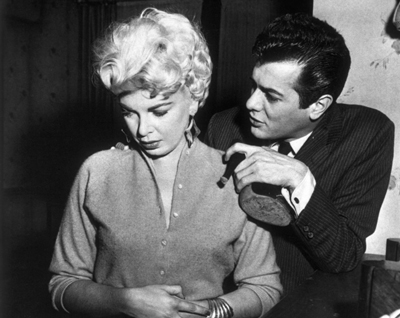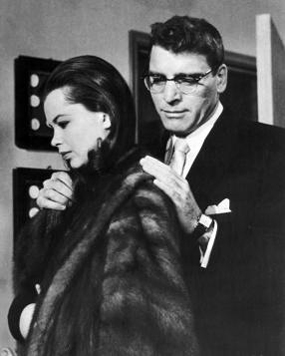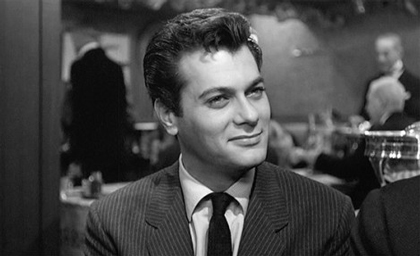
 |
|
|
|
This stunning Criterion special edition brings new insights to an accepted American classic. Alexander Mackendrick's 1958 Sweet Smell of Success is a late entry in the classic era of film noir, sharing that post with Touch of Evil and possibly Vertigo.. To some film fans, it's the show with the acid-tongued dialogue quoted interminably in Barry Levinson's Diner. The video and text extras on Criterion's new Blu-ray align Sweet Smell with real people and events that impacted New York life in the 1950s, showing the relationship of powerful newspaper columnists to police corruption, political smears and personal vendettas borne of inflated egos and overweening ambition. 
Ex- press agent Ernest Lehman limited his exposés of the Broadway columnist racket to short stories, until such time as the feared columnist Walter Winchell's power had dimmed enough to allow the independent production companies formed around Burt Lancaster and Tony Curtis to gamble on a film adaptation. Sweet Smell of Success is almost too complex and labyrinthine to be grasped in a single viewing; when new it must have sailed over the heads of the general public. With many scenes filmed on the streets of New York by the famed cinematographer James Wong Howe, the movie paints a sordid, guilty, neon Broadway portrait of the abuse of power. Audiences clearly weren't prepared for tainted protagonists that laid bare their inner selves, only to reveal yet more layers of rot. To curry favor with the all-powerful and unpredictably vindictive Broadway columnist J.J. Hunsecker (Burt Lancaster), ultra-obsequious press agent Sidney Falco (Tony Curtis) has abandoned all pride and ethics. Hunsecker makes and breaks careers of small-time entertainers and major politicians according to his personal whims. He's also domineering in his personal life. Fearing that his younger sister Susan (Susan Harrison) will leave him to marry jazz musician Steve Dallas (Marty Milner), J.J. entreats Sidney to actively break up Susan and Steve's romance. Sidney has little choice but to comply: not only can the spiteful Hunsecker freeze Falco out of his column, he can sic the brutal Police Lt. Harry Kello (Emile Meyer) on him. Using cigarette girl Rita (Barbara Nichols) as sexual bait, Falco convinces columnist Otis Elwell (David White) to run a "blind item" smear claiming that the arrow-straight Dallas is a dope-smoking Communist. Dallas falls into Falco's trap and tells J.J. off in no uncertain terms, in public. The romance seems to be finished, but Hunsecker isn't satisfied: he wants Dallas destroyed, and promises Falco a major career advance when the job is done. But that's when Susan springs a reckless trap of her own. 
The searing film noir Sweet Smell of Success is also a disturbing cautionary drama decrying the disproportionate power wielded by media demagogues like J.J. Hunsecker. Ernest Lehman based his tale directly on real-life personalities; his J.J. character is an undisguised Walter Winchell. The story plays as far less "fictional" than earlier noir hustlers trying to game the system: Kirk Douglas's reporter in Ace in the Hole, and Richard Widmark's promoter in Night and the City. Sidney Falco is an exemplar of a type we've all met, the hungry, ethically challenged guy seemingly eager to compromise himself in the race to get ahead. Sidney knows that he's completely dependent on his master's good will: he's always there ready to light Hunsecker's cigarette. When J.J. calls Sidney "a cookie full of arsenic", it's really a compliment from an unholy monster. To others Sidney is a "trained poodle" or "the boy with the ice cream face". A senator's mistress thinks Falco is so pretty that he ought to be an actor. That of course fits Tony Curtis to a T: it's the role he was born to play. Sweet Smell's unending barrage of smart, caustic talk blends Broadway-showbiz argot with co-screenwriter Clifford Odets' own brand of baroque dialogue. The stylization in Odets' earlier noir Deadline at Dawn gets so extreme that the characters almost seem to be talking in a foreign language. Odets' crisp additions to Lehman's text are for the most part keyed to the characters. Burt Lancaster and Tony Curtis speak perfectly measured barbs that feel like fist punches and knife stabs. The patter only goes out of control when Odets (or Lehman?) gives the less Machiavellian Steve Dallas some real whoppers, including one of the most purple quotes in film history: "That's fish four days old. I won't buy it!" One can't even imagine a jazz musician saying that one. 
Classic-era New York noirs dote on atmospheric street scenes and car chases on Manhattan's streets, but none of them equal the you-are-there feeling imparted to Sweet Smell of Success. J..J. Hunsecker watches a drunk being ejected from a club and shouts, "I love this dirty town!" We feel the ambience of Broadway at two and three a.m., with Sidney shivering because he can't afford to check a coat in the ritzy haunt that serves as Hunsecker's late night office. We've heard stories about the power wielded by Walter Winchell and his rival Ed Sullivan, especially when a fast slur in one of their columns could land a disfavored entertainer on the blacklist. Both columnists kept enemies lists; Winchell was a supporter of Joseph McCarthy. The Falco and Hunsecker characters are so wrapped up in their personal schemes that it's easy to miss the fleeting moments where they reveal traces of inner morality. Although Sidney tries to save face by claiming that his corruptibility has limits, he jumps whenever J.J. offers a new carrot. When faced with personal disaster, both men turn up hollow. At the finish, the terrible Hunsecker seems to have lost all traces of human feeling, and stands staring at his domain like a dead man. We don't even know if Sidney will survive -- he knows too many of his master's dirty secrets. The supporting cast of Sweet Smell of Success sees several actors giving especially strong performances. Barbara Nichols is both heartbreaking and hilarious as a woman callously used by Falco as a good-time girl. The worried-looking Jeff Donnell serves as Falco's ignored and pathetic conscience. Sam Levene's New York credentials make him an appealing agent for Steve Dallas, while Lawrence Dobkin and Lurene Tuttle gain points by showing integrity in the face of Falco's cheap blackmail attempt. Finally, there's Emile Meyer's glowering, syntax-mangling cop, who packs more violence into one dialogue line than any number of on-screen beatings: "Ha! Ha! Ha! Come back Sidney! I want to chastize you!" 
Criterion's Blu-ray of Sweet Smell of Success gives us a stunning HD transfer of this beautifully shot B&W film. No matter how low-key the lighting, the transfer has less distracting grain than most "on location" B&W films. With so many scenes playing in interesting nighttime locales, James Wong Howe's images are both naturalistic and stylishly expressive. Key exteriors give us sweeping vistas of Times Square, with a Cinerama marquee on one side and a giant poster for Baby Doll further up the block. The baleful J.J. Hunsecker always towers above the venal Sidney Falco, who orbits him like a remora following a shark. A midpoint character portrait of Hunsecker staring down from his town house at the city lights gives us an image of a stern lord contemplating his domain. The scene is helped immeasurably by Elmer Bernstein's lurid, jazzy score and its suggestions of pent-up malice. Although we only hear a few snippets, The Chico Hamilton Quintet "plays" Steve Dallas's band and provides a persuasive jazz club atmosphere. Disc producer Curtis Tsui's extras score with prime source materials. The Man Who Walked Away is an excellent Scottish TV documentary on the career of the revered director Alexander Mackendrick, and James Wong Howe, Cinematographer is a 1973 interview piece in which the Chinese-American cameraman discusses creative techniques he's honed since the silent days with Mary Miles Minter. Author and historian Neal Gabler appears in a new interview delineating the life and times of Walter Winchell. He contrasts Winchell's personality with the fictional J.J. Hunsecker, who Gabler feels is too malevolent and contemptuous to function as a Broadway columnist. Other extras include an interview piece with James Mangold, a Mackendrick pupil and disciple; and a full feature audio commentary by film scholar James Naremore. The fat (56-page) insert booklet opens with Gary Giddens' absorbing essay, part of which delves into the real-life underpinnings and background lore referenced in Sweet Smell. Angered by his daughter's romance, Winchell reportedly had her institutionalized and her boyfriend railroaded into prison by the F.B.I.. Giddens also brings up a scandalous 1920s incident in which Al Jolson punched out Winchell for selling a screen story based on Jolson's relationship with Ruby Keeler, and her status as the under-aged girlfriend of a gangster. The essay makes a persuasive argument that elements in Fitzgerald's The Great Gatsby refer to Winchell as well. Ernest Lehman had good reason to feel insecure when writing his short stories, as he was criticizing a man who could call in favors from the underworld as well as J. Edgar Hoover. Giddens' essay is followed by two Ernest Lehman short stories featuring the Hunsecker and Falco characters, Hunsecker Fights the World and It's the Little Things that Count, along with an introduction by the author.
On a scale of Excellent, Good, Fair, and Poor,
Sweet Smell of Success Blu-ray rates:
Reviews on the Savant main site have additional credits information and are often updated and annotated with reader input and graphics. Also, don't forget the 2010 Savant Wish List. T'was Ever Thus.
Review Staff | About DVD Talk | Newsletter Subscribe | Join DVD Talk Forum |
| ||||||||||||||||||